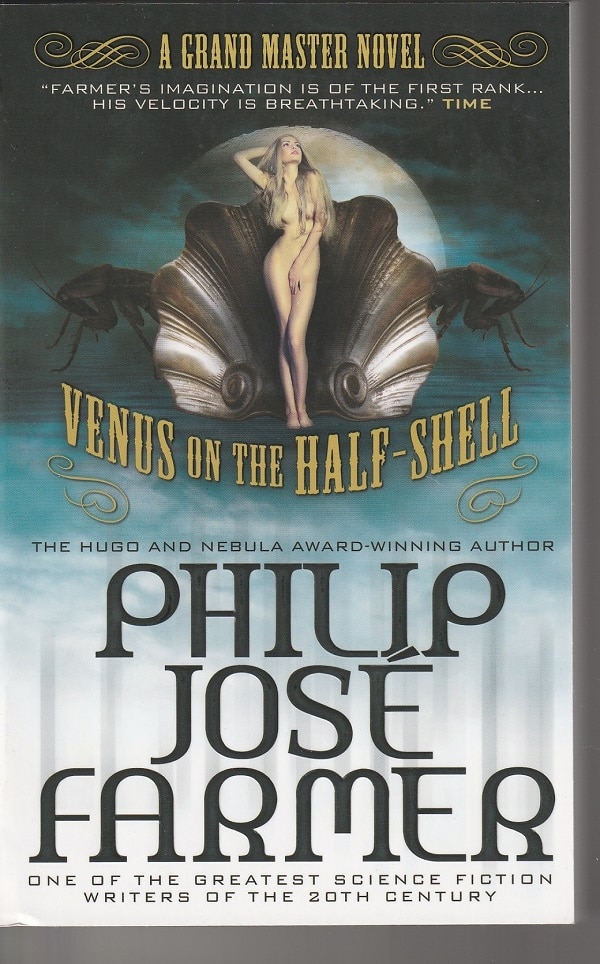Philip Jose Farmer’s 1975 novel Venus on the Half-Shell was based on a gimmick, so it’s not surprising that it’s filled with gimmicks, most of which, to my mind, seem rooted in a high school sophomore’s sense of humor.
There are those, I’m sure, who will tell me I’m wrong, who will tell me I’m missing Farmer’s brilliant imagination and zesty, sexy, story-telling verve. He is, after all, one of the great names of American science fiction in the second half of the 20th century.
In my twenties, I read Farmer’s Riverworld novels and liked them. They, too, were based on a gimmick, a world where a wide array of historical characters are resurrected, including Samuel Clemens, Mozart, Hermann Göring, Alice (as in Wonderland) Hargreaves, Nero and Sir Richard Francis Burton, and who go about solving a mystery. The five novels, as I recall them, were closely plotted and told in a straight-forward manner.
By contrast, Venus on the Half-Shell struck me as being 268 pages of authorial self-indulgence. In fact, when you include, as my edition did, a foreword and two afterwords by Farmer and his alter-ego Jonathan Swift Somers III, it’s 302 pages of self-referential cleverness.

Main gimmick
Venus’s main gimmick is that it was created to bring into being a fictional novel that Kurt Vonnegut mentions in his 1965 novel God Bless You, Mr. Rosewater. One of Vonnegut’s characters picks up what looks like “one hell of a sexy paperback novel, Venus on the Half-shell by Kilgore Trout.”
Vonnegut mentions Trout in several of his novels, and many readers believe that he uses Trout as a stand-in for himself. Trout, who is described as not a very attractive person, appears as a character in Rosewater. And a five-paragraph excerpt from Trout’s Venus is provided by Vonnegut — an excerpt that begins:
“Queen Margaret of the planet Shaltoon let her gown fall to the floor. She was wearing nothing underneath…”
Well, Farmer got the idea of taking those five paragraphs and writing about 1,400 more to bring the Venus novel to the world. He eventually got permission from Vonnegut to use those five paragraphs and the Venus title and, ostensibly, to present the novel as having been written ostensibly by Trout.
Ain’t Vonnegut or Swift
What became clear to me as I read Farmer’s Venus was that Vonnegut’s five paragraphs were a drop in Farmer’s bucket. And one other thing: Farmer ain’t Vonnegut.
Neither is Farmer Jonathan Swift, even though he borrows Swift’s storytelling framework from Gulliver’s Travels to tell his tale of the Space Wanderer, Simon Wagstaff, the only earthling to survive a deep cleaning of the planet by an alien race, and borrows Swift’s name for Farmer’s own alter ego, Somers, whose own Trout-like novels are referred to here and there throughout Venus.
Vonnegut does this sort of thing well and with nuance. Farmer does it with a sledgehammer.
Just as he uses a sledgehammer to write the many scenes in the book involving sex and anuses and farts and to craft his zesty language, such as this description:
“The sky was as blue as a baby’s eye, and the air was as clear as a baby’s conscience. A newly born wind cried softly in his ear. The sun shone as brightly as a fond mother’s smile.”
Maybe Farmer was being facetious here, writing bad prose for comic effect. If so, it seemed to me he was trying for comic effect with nearly every sentence he wrote.
Which might be funny for a page or two. But for 268?
Patrick T. Reardon
4.29.21
Written by : Patrick T. Reardon
For more than three decades Patrick T. Reardon was an urban affairs writer, a feature writer, a columnist, and an editor for the Chicago Tribune. In 2000 he was one of a team of 50 staff members who won a Pulitzer Prize for explanatory reporting. Now a freelance writer and poet, he has contributed chapters to several books and is the author of Faith Stripped to Its Essence. His website is https://patricktreardon.com/.
